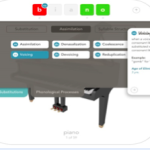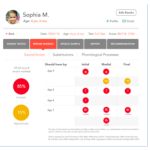Speech Therapy App Review – Articulation Test Center by Little Bee Speech
Review of Articulation Test Center, by Little Bee Speech
I had the opportunity to demo and review the speech therapy app Articulation Test Center, a recently published diagnostic app developed by Little Bee Speech, the makers of Articulation Station.
First, a little background: Articulation Test Center is intended to be the diagnostic corollary to Articulation Station, the company’s flagship app and a one-stop shop for all of your articulation-related treatment needs. Articulation Test Center is that one-stop shop for all your articulation-related diagnostic needs and includes two main assessment tools: Quick Test and Full Test, the former being a screening tool either to rule out a possible articulation delay or disorder, or to use an ongoing, dynamic assessment tool throughout therapy; the latter is a more comprehensive assessment instrument that would more definitively suggest the presence or absence of an articulation delay or disorder.
Regarding the general look, usability and functionality of the app, this app is unparalleled. It is intuitive, efficiently constructed and looks beautiful. I personally care about the look of the apps I use in my clinical work and in this respect, the Little Bee Speech products, including Articulation Test Center, simply have no equal, from the graphic identity to the images selected.
The Quick Test and the Full Test have a similar user platform. Each test item includes a picture slide with the test sounds highlighted in the form of interactive buttons. These buttons allow you to mark whether the item was produced incorrectly. There is also a drop-down box that allows you to select the substitution the child made. For example, if a child were to alveolarize /k/, you would touch on /t/ and drag it over the /k/, indicating the substitution. In this drop-down menu, there’s a second tab that allows you to select a phonological process (in this case, alveolarization) and drag that over the error sound /k/. This helps you keep track of not only sound inventory but also the presence of phonological processes.
At the end of each test you may take a speech sample and provide a subjective judgment of intelligibility of “good”, “fair” or “poor”. The app then auto-generates a report based on test results and derives a percentage of sounds correct. This report may then be emailed to you for editing.
One tip I would suggest in using Articulation Test Center would be to de-select all vowels (unless you suspect the client has trouble with vowels) before you begin a test session. This would allow the app to derive Percentage Consonants Correct, a long-established metric for judging a child’s intelligibility. In fact, I would suggest the makers of Articulation Test Center consider allowing the user to de-select all vowels in one fell swoop rather than manually, to make this easier. Perhaps this could be incorporated into an update of the app.
Also, on each slide the record-and-playback function, a common feature of apps, is well placed and easy to use. I would suggest recording the entire assessment session to ensure you heard every production correctly; no more relying on a separate recording device when using a paper-based assessment tool! The app also has a note-taking feature that is specific to that slide. If a child needs a hint on a particular test item, you simply tap each picture to bring up two cues, one in the form of a statement, the other a question. Other interesting features include the ability to test only the various forms of /r/, vowels only, or to select items based on word position (initial, medial, and final).
Overall, my impression of Articulation Test Center is highly positive. Not only is it visually pleasing, easy to use, but you can get most of the benefits of a standardized assessment tool, such as the Goldman-Fristoe Test of Articulation, for a fraction of the cost of the Goldman-Fristoe ($50 versus $282). If a standard score, percentile rank and age equivalence are essential to your assessment, then of course the Goldman-Fristoe or another similar standardized tool would be indicated. However, I plan to use Articulation Test Center often in my private practice and applaud Little Bee Speech for a job well done.





